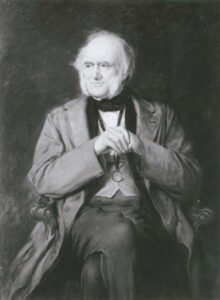 “Geology is intimately related to almost all the physical sciences, as history is to the moral. An historian should, if possible, be at once profoundly acquainted with ethics, politics, jurisprudence, the military art, theology; in a word, with all branches of knowledge by which any insight into human affairs, or into the moral and intellectual nature of man, can be obtained. It would be no less desirable that a geologist should be well versed in chemistry, natural philosophy, mineralogy, zoology, comparative anatomy, botany; in short, in every science relating to organic and inorganic nature.
“Geology is intimately related to almost all the physical sciences, as history is to the moral. An historian should, if possible, be at once profoundly acquainted with ethics, politics, jurisprudence, the military art, theology; in a word, with all branches of knowledge by which any insight into human affairs, or into the moral and intellectual nature of man, can be obtained. It would be no less desirable that a geologist should be well versed in chemistry, natural philosophy, mineralogy, zoology, comparative anatomy, botany; in short, in every science relating to organic and inorganic nature.
With these accomplishments, the historian and geologist would rarely fail to draw correct and philosophical conclusions from the various monuments transmitted to them of former occurrences. They would know to what combination of causes analogous effects were referable, and they would often be enabled to supply, by inference, information concerning many events unrecorded in the defective archives of former ages. But as such extensive acquisitions are scarcely within the reach of any individual, it is necessary that men who have devoted their lives to different departments should unite their efforts; and as the historian receives assistance from the antiquary, and from those who have cultivated different branches of moral and political science, so the geologist should avail himself of the aid of many naturalists, and particularly of those who have studied the fossil remains of lost species of animals and plants.”
– Charles Lyell, Principles of Geology, or The Modern Changes of the Earth and Its Inhabitants Considered as Illustrative of Geology, Ninth Edition (1853)
(Like far too many foundational classics of natural history, the complete Ninth Edition of Principles of Geology is no longer in print, however University of Chicago Press continues to publish a three volume set of the First Edition from 1830.)
